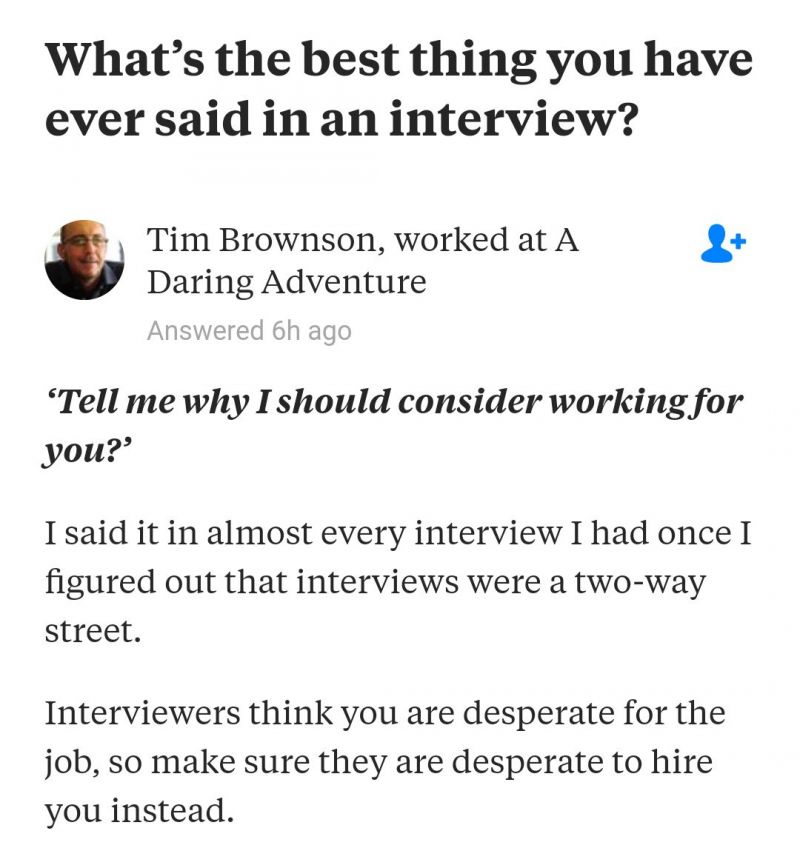Ranter
Join devRant
Do all the things like
++ or -- rants, post your own rants, comment on others' rants and build your customized dev avatar
Sign Up
Pipeless API

From the creators of devRant, Pipeless lets you power real-time personalized recommendations and activity feeds using a simple API
Learn More
Comments
-
nitnip17404yAsk for the kinds of projects they've worked on (if the person you're interviewing feels like breaking NDAs, it's on them so don't feel obligated to give them a reminder.)
Ask for their experience with front end frameworks. (Even if it overlaps with previous answer(s), try to steer the conversation back to this topic)
Ask for their experience with ReactJS, (Even if it overlaps with previous answer(s), try to steer the conversation back to this topic) .
X+ years of experience do not really matter. If they have confidence and don't seem to be bullshitting you about their knowledge, it's what you're looking for. -
nitnip17404yAlso, I'd say IF you really feel the candidate has the knowledge but has zero confidence (impostor syndrome), give them an easy code assignment. Nothing too fancy or time consuming.
Something like a blog or barebones forum (Users, Article, Comments)
User can log in
User can create an Article (and edit/delete his own Articles)
User can leave a Comment on any Article (and edit/delete his own Comments).
---
Or don't, it's not really your job to play shrink with the candidates, but it's an option. Discuss it with whoever else is in charge of interviews. -
 sariel78784yBrainstorm it bro.
sariel78784yBrainstorm it bro.
Get a whiteboard and wireframe out some UI and plan out some UX for some problems you have internally.
Make sure you don't give away any NDA secrets though.
While you're doing that throw in some recent curve balls your team recently overcame and see how the candidates would have solved them.
Not only do you get to feel how it would be like to work with them, but you actually prepare the candidate for the same work that they will be doing if they are hired. -
 dootlurk5784yFor a Technical interview, give them something to debug. It could be based on what you'll actually have them working on, to give them an idea of what it'll be like, and will show you whether they can do what they say.
dootlurk5784yFor a Technical interview, give them something to debug. It could be based on what you'll actually have them working on, to give them an idea of what it'll be like, and will show you whether they can do what they say.
My current place has a two part exercise where you have to debug some backend bits and also work on a "whiteboard" (word document) process without no code to show programmatic thinking. Every dev interviewing does this, which is also a consistent base to measure them against -
Cover the basics:
1. How will the candidate handle success?
2. How will the candidate handle failure?
3. How will the candidate solve unexpected Changes in the tasks?
4. How does the candidate overcome problems?
5. Does the candidate have the relevant skills for his CV/experience level?
Design any scenario that you feel you can do in one hour. Example:
whiteboard solutions. Actual code writing. Ask to describe past experiences. Technical questions.
What to avoid: technical gotcha, and scripted q&a. make sure you read the CV before the interview. -
My 2c, ask how the person learns. For me, recurring to books or complete courses online is a big plus. Watching youtube, meh. "I learn from my own experience" may sounds bold but it is dangerous, the person risk not being exposed to new ways of doing things.
Related Rants

 Stackoverflow.
Stackoverflow. For those of you who are having interviews ... remember this
For those of you who are having interviews ... remember this
A new position is opened at my company and I am tasked to conduct interviews for the candidates. I have no experience whatsoever in this.
If you’ve had any experience, how did you approach this? How did you conduct technical interviews with the candidates? We’re talking about candidates that have 3+ years of experience.
The position is for front end, mainly ReactJS.
question
interview